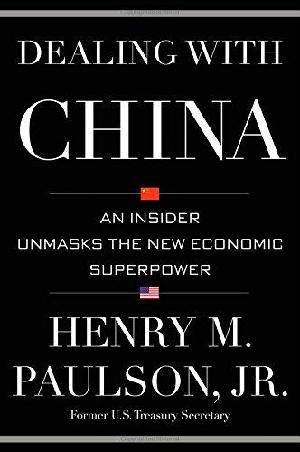By staff reporter ZHOU LIN

Dealing with China: An Insider Unmasks the New Economic Superpower
Author: Henry M. Paulson Jr.
Price: US $34
Hardcover, 688 pages
Published by Grand Central Publishing
How to Deal with China?
By staff reporter ZHOU LIN

Dealing with China: An Insider Unmasks the New Economic Superpower
Author: Henry M. Paulson Jr.
Price: US $34
Hardcover, 688 pages
Published by Grand Central Publishing
ON the public home page of the online book club A Year of Books created by Mark Zuckerberg, Henry Paulson’s Dealing with China ranks eighth among the top 10 recommended reads.
The 69-year-old banker-turned-statesman has 25-years’ experience working with Chinese high-ranking officials, and has visited China over 100 times.
Starting in 1992, Henry Paulson’s personal interests evolved from business investment to in-depth policy discussion and opinions on U.S.-China relations. As CEO of Goldman Sachs from 1999 to 2006, he successfully led the largest private equity investment in the history of the group, spending about US $2.6 billion on a seven–percent share of the Industrial and Commercial Bank of China (ICBC). Then, as the Treasury Secretary of the Bush administration from 2006 to 2009, he advocated the establishment of the Strategic Economic Dialogue between the U.S and China. American media regarded him as an advocate of the U.S. policy towards China. A pivotal politician who has sat across the bargaining table from Chinese politicians countless times, Paulson is now enjoying his retirement. He is the president of the Paulson Institute of Chicago University, which independently promotes the sustainable development of relations between the U.S. and China.
The last 30-plus years have seen China become the world’s second largest economy. People are naturally curious as to how China has achieved this rapid rise and its effect on the rest of the world. In Dealing with China, Paulson discusses China’s economic reform, communication strategy changes between the U.S. and China, and the future path of China’s development.
The anecdote-rich page-turner reveals the real faces of China’s leaders. The author recalls his visits to China as a senior executive of Goldman Sachs and his first visit to Hangzhou’s West Lake as the Treasury Secretary in September 2006 when he met Xi Jinping, then secretary of the CPC Zhejiang Provincial Committee. Paulson says he had no idea Xi would go on to become Chinese president, and tells of his strong desire to meet Xi because of their mutual interest in private enterprises.
Paulson agrees with the path of reform on which President Xi Jinping is currently steering China and regards it as globally significant. He admits that he has never before witnessed a leader of any nation with greater ambition than Xi in fields spanning economic restructuring and large-scale urbanization, action on military affairs, foreign diplomacy, legislation, and anti-corruption.
He comments extensively on U.S-China relations within the current climate, saying that it has become more complicated and intricate. According to Paulson, the change in Americans’ attitude towards China is understandable since some Chinese companies are now swimming upstream along the production chain and in direct competition with American enterprises on the market. Some studies also reveal that China is excelling in innovation, which Paulson thinks is due to the reduction of limitations on the exchange of ideas, previously a barrier for high-level innovation in the technological era.
So how does Paulson suggest America deals with China? His prescription is simple: Keep a clear mind and maintain constructive cooperation with China because the two nations share the same interests. Without collaboration between the two major powers of the world, global challenges including environmental and economic problems, food security and nuclear pervasion, would remain unsettled.
Paulson criticizes the U.S. government’s attitudes and handling of U.S.-China relations and proposes eight principles for policymakers on how to conduct fruitful cooperation. Paulson reaffirms the importance of supporting the Chinese government’s actions on promoting transparent governance and sticking to international standards so as to help China exert a leading role in international organizations, such as the WTO. From Paulson’s view, open-minded exchange is essential for solving complicated problems. It is the effective communication of SED that paved the way for NASDAQ Stock Market and NYSE to open an office in the Chinese mainland.